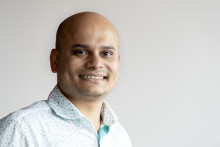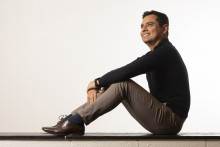Anurag Kulshrestha
PhD research topic: Spatio-temporal modelling of Synthetic Aperture Radar (SAR) interferometry data for detecting sinkhole related deformations
Works at: Department of Earth Observation Science, the Faculty of Geo-Information Science and Earth Observation (ITC)
Studied: Master’s in Physics at the Indian Institute of Science Education and Research & Master’s GIScience and Earth Observation at from ITC
Originally from: Agra, India
‘I’m a physicist. After I graduated from the Indian Institute of Science Education in 2014, I was curious about exploring other things. I worked for my family’s business in logistics and I also founded my own start-up focused on integrated bio farms – converting waste to biofuels. But I never really left physics. Science was always on my mind. My father also encouraged me to spread my wings and fly higher. After a couple of years, I started a joint Master’s programme at the Indian Space Research Organization (ISRO) and ITC. I got to spend one year at ISRO right at the foot of Himalayas, and half a year in Enschede. It was an amazing experience.

I was really intrigued by ITC, the work ethic and the people here. And I thought the combination of physics and geography within Earth Observation was fascinating. I found my love for radar remote sensing here. In my PhD research I use radar images to study deformation of earth. I apply this knowledge for analysis of geohazards, such as sinkholes. Even though we cannot see it with the naked eye, the Earth keeps moving all the time. We can observe that using satellite imagery. Thanks to radar satellites, surface deformation can be estimated with the precision of millimetres. That is simply astounding! In my research I focus on areas prone to geohazards, trying to establish if there are spatio-temporal deformation patterns before appearance of such hazards. I have established that there are indeed deformation patterns and now the next question is: can we predict them in time, so that we can raise the alarm before a disaster happens?’
‘I’m now in the final stretch of my PhD journey. It has taken me a bit longer, because I also a took a six months sabbatical to fully focus on teaching. It has been an amazing experience. There has been so much excitement and the work has been joyful. I’ve had amazing colleagues. ITC is a very diverse environment, and so you can always get a new perspective on your work. I also cannot thank my supervisors enough. It has been wonderful. You get four years to fully commit to a topic and a lot of freedom to navigate the research in your own way. It’s a great opportunity to focus on something so deeply.
I’m a very positive person, but the pandemic was difficult. I could have done without it. I’m very expressive and social, and so it was hard at times. I couldn’t travel to India to visit my mother when she was ill and I lost two years of normal research. On the other hand, it allowed me to find my love for cooking, gardening and biking. I discovered new hobbies that I still keep to this day. I found that there is life beyond workplace. That wasn’t engraved in us. In India, the academic environment is very competitive and you have to stay ahead, to always have an edge. I enjoy the balance here.

I definitely want to stay in academia. I like research and I like teaching. I enjoy the idea that my work can influence the scientific society and perhaps even society in general. I’m really happy that I did a PhD and I would recommend it to others, but I’d say: Only do it if you are prepared to dedicate four years to answering one question. You need to have passion for it, otherwise it will not be as enjoyable.’







